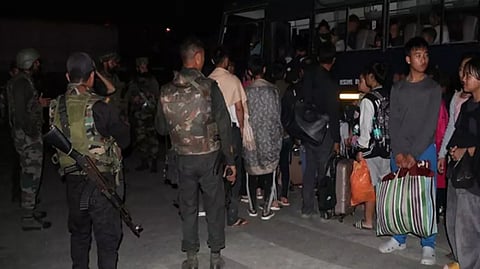

If after raging for more than seven weeks the ethnic violence in Manipur is nowhere near being controlled, the inevitable conclusion is that there has been a total failure of the state government. However, if there is no improvement after deploying thousands of central paramilitary personnel in the border state, then it can be argued that the central government must share the blame equally. And, if there’s no sign of a return to peace even after Union Home Minister Amit Shah himself spent four days in Imphal, then it indicates that New Delhi has no channels through which the contending ethnicities can be brought together for a negotiated settlement. Not only is there no sign of a track two approach, there seems to be no confidence in the 53-member peace committee announced by Shah. In fact, it is disconcerting to see important members of the committee distancing themselves from it.
This state of affairs is a reflection of New Delhi’s lack of decisive action. Since flaring up on May 3, the violence between Meiteis and Kuki tribes has resulted in the loss of more than 100 lives, widespread destruction of property, and displacement of thousands. The government’s response has been woefully inadequate, raising serious questions about its commitment to the security of the people.
One of the obvious failures lies in the delayed deployment of central forces. It was evident from the beginning that the Meitei-dominated local police would not play a non-partisan role in the conflict and would only aggravate the distrust harboured by the Kuki and Naga tribes towards the N Biren Singh government. Not that the Assam Rifles would have been more welcomed, given the decades-old antipathy tribesmen have for that force, but leaving it to the local police to handle the rioting in the first few weeks was a recipe for disaster.
Deploying central forces sooner would at least have averted the looting of thousands of weapons from police armouries in the state,. which could not have occurred without the complicity of local cops. Nor would Meitei vigilante groups have been allowed to run riot against tribal people.
The partisan role of local police is a recurring trope in identity-based ethnic conflicts in India. The Gujarat riots of 2002, the Muzaffarnagar riots in UP in 2013 and the New Delhi riots in 2020 are replete with instances of cops aiding one side against the other. This point would surely have been red-flagged by Home Ministry officials when tensions began to boil over in Manipur towards the end of April. Acting firmly on such alerts would be the first principles laid down in law and order operational manuals. Had that been followed, it might have nipped the rioting in the incipient stages.
Instead, what we had in the first week of May was total silence on Manipur by the PM and Home Minister who were busy campaigning in the Karnataka election. Even a statement by Modi would have served to calm tempers and assure them that their side of the story would be heard. It is one of the great riddles of the past nine years that the Centre is not lost for words during a verbal joust with the opposition but falls silent when a real challenge to its governance presents itself. It took several months for it to respond to wrestlers’ protest, a whole year to heed farmers’ voices, and many weeks to act on charges of rape against its legislators. This suggests that the present regime is far more engaged with changing the basic nature of our polity than to carry out the mandate vested in it by the people.